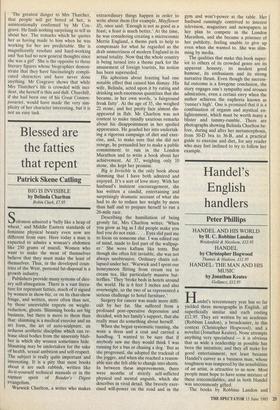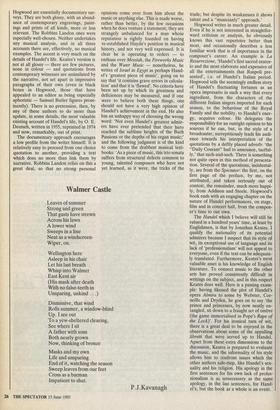Handel's English handlers
Peter Phillips
HANDEL AND HIS WORLD by H. C. Robbins Landon
Weidenfeld & Nicolson, £12.95
HANDEL by Christopher Hogwood
Thames & Hudson, £12.95
HANDEL: THE MAN AND HIS MUSIC by Jonathan Keates
Gollancz, £12.95
Handel's tercentenary year has so far yielded three monographs in English, all superficially similar and each costing £12.95. They are written by an academic (Robbins Landon), a broadcaster, in this context (Christopher Hogwood), and a novelist (Jonathan Keates). None attempts anything very specialised — it is obvious that as wide a readership as possible has been the intention; and they all make for good entertainment, not least because Handel's career as a business man, whose toughness was tempered by the sensibilities of an artist, is attractive to us now. Most people must hope to have some mixture of these irreconcilables, and in both Handel was uncommonly gifted.
The books by Robbins Landon and Hogwood are essentially documentary sur- veys. They are both glossy, with an abund- ance of contemporary engravings, paint- ings and prints of all kinds, more or less relevant. The Robbins Landon ones were especially well-chosen. Neither undertakes any musical analysis, and in all three accounts there are, effectively, no musical examples. The accent is very much on the details of Handel's life. Keates's version is not at all glossy — there are few pictures, none in colour — and quotations from contemporary witnesses are assimilated by the narrative, not set apart in impressive paragraphs of their own (even in black boxes in Hogwood, those that have appealed to an editor as being especially aphoristic — Samuel Butler figures prom- inently). There is no pretension, then, by any of these authors to do more than update, in some details, the most valuable existing account of Handel's life, by 0. E. Deutsch, written in 1955, reprinted in 1974 and now, remarkably, out of print.
The documentary approach encourages a low profile from the writer himself. It is relatively easy to proceed from one choice quotation to another, providing a text which does no more than link them by narrative. Robbins Landon relies on this a great deal, so that no strong personal opinions come over from him about the music or anything else. This is made worse, rather than better, by the few occasions when he does venture a statement; they are strangely unbalanced for a man whose reputation is rightly founded on having re-established Haydn's position in musical history, and not very well expressed. It is clear he is operating to orders — to enthuse over Messiah, the Fireworks Music and the Water Music — nonetheless, he writes of Israel in Egypt as perhaps Hand- el's 'greatest piece of music', going on to say that 'it contains grave errors in calcula- tion' and that it is 'flawed'. No criteria have been set up by which its greatness and deficiences may be measured, and if one were to believe both these things, one should not have a very high opinion of Handel's achievement in the end. He also has an unhappy way of choosing the wrong word: 'Not even Handel's greatest admir- ers have ever pretended that their hero reached the sublime heights of the Bach Passions or the depths of his organ music;' and the following judgment is of the kind to come from the drabbest musical text- books: 'As a piece of music, this trio sonata suffers from structural defects common to young, talented composers who have not yet learned, as it were, the tricks of the trade; but despite its weaknesses it shows talent and a "musicianly" approach.' Hogwood writes in much greater detail.
Even if he is not interested in straightfor- ward criticism or analysis, he obviously knows this vast repertoire better than most, and occasionally describes a less familiar work that is of importance in the composer's career. An example is La Resurrezione, `Handel's first sacred orator- io and the most elaborate and expensive of all the entertainments that Ruspoli pre- sented', i.e. of Handel's Italian period. Hogwood tells the seemingly endless story of Handel's fluctuating fortunes as an opera impresario in such a way that every ingredient, from the characters of the different Italian singers imported for each season, to the behaviour of the Royal Family and the nobility, to Handel's ener- gy, acquires colour. He delegates the responsibility for an outright opinion to his sources if he can, but, in the style of a broadcaster, surreptitiously leads his audi- ence towards his interpretation of the quotations by a deftly placed adverb: 'the "Daily Courant" had to announce, tactful- ly,' that such-and-such. There is something not quite open in this method of presenta- tion. Several of the quotations, incidental- ly, are from the Spectator: the first, on the first page of the preface, by me, not attributed, and taken seriously out of context, the remainder, much more happi- ly, from Addison and Steele. Hogwood's book ends with an engaging chapter on the nature of Handel performances, on stage, film and in concert hall, from the compos- er's time to our own.
The Handel which I believe will still be valued in a hundred years' time, at least by Englishmen, is that by Jonathan Keates. I qualify the nationality of its potential admirers because I suspect that its style of wit, its exceptional use of language and its lack of 'professionalism' will not appeal to everyone, even if the text can be adequate- ly translated. Furthermore, Keates's most valuable asset is his knowledge of English literature. To connect music to the other arts has proved consistently difficult in writings on the subject, and in this respect Keates does well. Here is a passing exam- ple: having likened the plot of Handel's opera Almira to some by Webster, Cor- neille and Dryden, he goes on to say 'the prince and princesses, by now neatly en- tangled, sit down to a fraught set of ombre (the game immortalised in Pope's Rape of the Lock)'. For his ironical turn of wit, there is a great deal to be enjoyed in the observations about some of the appalling libretti that were served up to Handel.
Apart from these extra dimensions to the discussion, Keates is prepared to evaluate the music, and the informality of his style allows him to confront issues which the other authors side-step, like Handel's sex- uality and his religion. His apology in the first sentences for his own lack of profes- sionalism is as unnecessary as the same apology, in the last sentences, for Hand- el's; but the book as a whole is an event.



















































 Previous page
Previous page